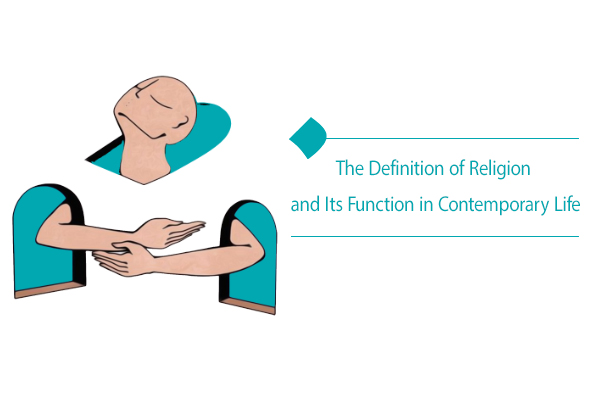How Important Is Restriction and Prohibition in the Definition of Religion?
What is the definition of religion?
We all have heard the word “religion” more or less, and based on our social or cultural conditions, we all define it differently. Most of us consider religion as a set of relatively rigid rules established by God, intended to lead us to bliss. Maybe we have thought less about this idea that religion is the specialized plan for our life. In fact, the definition of religion from our point of view is influenced by our knowledge about ourselves. The concept of religion will undoubtedly change in our eyes when we know our true self and we know that an origin, a destination, and an ultimate goal are determined for us and that we have a journey ahead to get there.
If we think carefully about the definition of religion, we see that all divine or non-divine religions have set a goal for life and then offered a specific lifestyle to achieve this goal. In light of this, in response to the above question, we can say that all religions are plans for human life. Considering what we mentioned about the principle of the primacy of expertise and our definition of the human being, it is not surprising that we only accept the definition of religion offered in Islam as the last and most comprehensive plan presented by our true Beloved.
In the definition of religion, rules have been set for every aspect of life and they put us within a specific framework. There are regulations and laws regarding God and also all of God’s creations, including ourselves, other humans, animals, plants, and more. Although by living within the framework of religion, we are put under the constraints of adhering to divine commandments, we must note, firstly, which dimension of our existence religion addresses, and secondly, these commands, prohibitions, and restrictions exist to accelerate our progress along the path and help us reach our ultimate goal. In this case, our view of religion, as a specialized plan for life and its commandments, also changes. Then as we can have a better understanding of the role and importance of religion, we will take a less oppositional stance towards it.
Which Dimension of Our Existence Is Addressed by Religion?

Generally, we can command and forbid someone who has free will. In previous lessons, we discovered that in each dimension of our existence- namely, inanimate, vegetative, animal, and intellective- we share existential qualities with inanimate objects, plants, animals, and angels. Furthermore, we know that none of these existential dimensions have free will. This effectively indicates that religion, which is full of commands and prohibitions, cannot address our inanimate, vegetative, animal, or even intellective dimension. If such were the case, then God ought to have sent prophets to guide plants, animals, and angels to happiness! But each of the vegetative and animal dimensions has a fixed status in the creation system and behaves in a predetermined manner through an innate and instinctive guidance. Even in the case of angels who are pure intellect, it has been stated that each of them has a fixed status and is purely obedient, and there is no way for them to disobey God’s commands.
Therefore, all the aspects and rules of religion only address the supra-rational or human dimension. This is the dimension that God has honored by breathing His own Spirit into it. In fact, our supra-rational dimension has no problem with the rules and restrictions of religion, but rather, it welcomes them. It is because from the perspective of the human dimension of our existence, religion is a specialized plan that smoothens the path to our ultimate goal.
What Is the Reason for Opposing Religion?
Now that we have reviewed the definition of religion and stated that this specialized plan for life is very important to achieve peace, happiness, love, and ultimately the purpose of our creation, a question arises: Why do some individuals oppose it? In the previous lessons, we learned that every dimension of our being, based on its compatibility, love, and desires, has a beloved, which is referred to as a deity. Our devotion to satisfying the needs of each dimension of our being and the extent of our love for and involvement with each-whether it is inanimate, vegetative, animal, intellective, or human- show to which level of our existence we have given primacy. Indeed, our focus on any of these dimensions means that we are obeying the deity of that dimension.
When the human being, who has a divine status, obeys the deity of other dimensions of her being, she, indeed, abandons her true deity and makes the beloveds of other dimensions her deity. In general, we call such a deity the “lower desire.” Lower desire means anything that we long for, but has a lower status than our supra-rational faculty in our hierarchy of existence. If we continue to value this deity, it becomes so powerful and dear to us that it regulates the activities of the other dimensions of our existence to satisfy its desires.
This process can continue to the point where we lose our true self and give in to this dimension. As a result, we stand against the commands and prohibitions of God. This inevitable result stems from a lack of proper or sufficient self-knowledge, so we cannot accurately identify our true beloved and main goal. In fact, we consider the religion that seeks to control the lower dimensions of our existence for the growth and development of the main dimension of our existence as restrictive.
This kind of perspective and definition of religion is similar to a student who is preparing for the university entrance exam and following the school counselor’s guidance program. Yet since this program emphasizes controlling non-school study time, sports, leisure activities, parties, and similar entertainments, she sees it as restrictive. Thinking this way might not make her fail at getting into university, but it can lead to less success. This happens because she has lost sight of her primary goal and is getting distracted by trivial things. This is something that many of us experience in life. We get so involved in pointless and limited worldly things that we forget our primary goal. As a result, we completely ignore the plan designed to guide us to the purpose of our creation, i.e., religion, or consider it constraining.
What Makes Religion Our Priority?
Although God acknowledges our love for the beloveds of the lower dimensions of our existence, He asks us to love the perfections of each dimension within its own bounds. He demands that our love for the beloved of our human dimension, namely God, surpass all other forms of love. This requires a proper knowledge of ourselves and a correct understanding of the definition of religion as the only accurate and complete plan for achieving an eternal life in peace and happiness.
When we gain this level of knowledge, we will not ruin our relationship with our one and only eternal Beloved for the sake of finite achievements; consequently, we will accept religion as a plan designed by the Creator for us to reach the purpose of our creation.
In this article, we discussed the role of religion as a specialized plan for our lives. We can conclude that religion is a comprehensive program for all periods of human life. This is because our human essence is not dependent on when and where we live, but it originates from the fitrah of all of us; therefore, returning to religion is the only remedy for the spiritual afflictions of humanity today. We stated that religion addresses the supra-rational or the human dimension of our being, and we will not feel comfortable with the rules and restrictions of religion if we define ourselves based on the lower dimensions of our existence. But if we arrange our hierarchy of love correctly and place the Beloved of our supra-rational dimension on top, we will consider religion as a specialized plan for the growth of our human dimension.
What is your view of religion? Do you see it as something which limits you or as a plan designed to take you safely to your destination?

